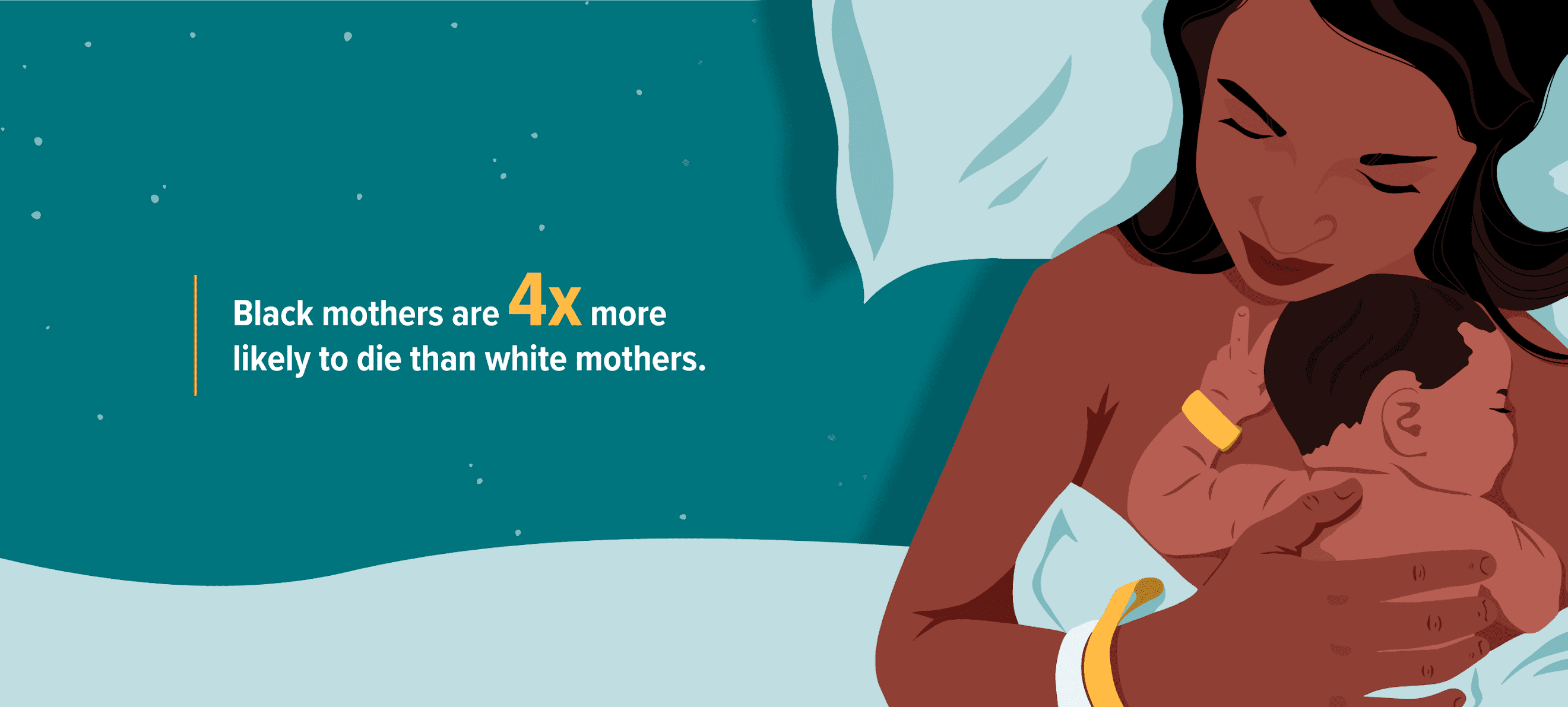5 tips for women concerned about the high mortality rates in pregnancy and childbirth
A note about Author, Sharlene Dougan: Meet Sharlene Dougan, an experienced nurse with a passion for patient care. Sharlene has been a nurse for seven years, devoting six of those years to critical care. She earned a Bachelor of Arts degree in Biology from Rutgers University in 2011 and volunteered in the NICU at Cooper University Hospital, where she discovered her love for nursing. In 2016, Sharlene returned to school and earned her Associate's in Nursing, followed by her BSN in 2017. After a year at an Urgent Care facility, she accepted a position in the ICU as a Registered Nurse at a community hospital.
Sharlene's dedication to nursing led her to further her education. She earned her MSN in Education in 2019, a specialty certification for Critical Care Registered Nurses (CCRN), and her Lactation Consultant certification in 2022. She now serves as an Advanced Nurse Clinician, striving to provide the best care to her patients. Sharlene's passion for nursing continues, as she will begin her Doctorate in Nursing Practice in the fall.

Sharlene with her sweet baby!
This article is for every person who is concerned with the high mortality rates in pregnancy and childbirth. I hope I do not offend or exclude any persons using these terms such as women or mothers. I am writing this from my perspective and how I identify. These tips benefit everyone.
Racial disparities in healthcare are a persistent issue in the United States. This is particularly true for Black mothers, who are more likely to experience complications during pregnancy and childbirth and are at a higher risk of maternal death. One study found that Black women were less likely to receive pain medication during labor than white women, even when they reported similar levels of pain. This disparity in pain management can have serious consequences for Black mothers, who may experience more stress and trauma during childbirth (Hoffman, Kelly M et al).
“African American women are three to four times more likely to die during or after delivery than white women.”
Harvard School of Public Health, America is Failing its Black Mothers
While healthcare recognizes these disparities and many institutions have created Diversity, Equity, and Inclusion (DEI) initiatives, Black women still face daunting statistics when it comes to a safe and healthy deliveries. The first step toward fixing the problem is educating healthcare professionals on DEI before they enter their professions. DEI education must be provided at medical schools and nursing schools, while also correcting current workforce behavior and beliefs. It is our responsibility as healthcare workers to learn and practice these initiatives because change is needed right now. If you are a woman in America, you probably know the statistics. If you are a Black woman in America, you fear that you will become one of those statistics.
For all women, one thing is clear – you need to advocate for yourself and your baby through every stage of pregnancy. I collaborated with several interdisciplinary fields such as doulas - trained professionals who provide expert guidance and support-, labor and delivery nurses, Women's Health physicians, and Obstetric Gynecologists to provide five ways to reduce your risk of death during a hospital delivery and advocate for yourself or a loved one.
Since you have entrusted your health and safety – and that of your baby - to healthcare providers, you should know what to expect and what is in the realm of normalcy during pregnancy and delivery. Pregnancy is one of the biggest changes a woman's body will go through, and you should be fully aware of the facts so that you can make informed decisions.
I am a healthcare professional, but my expertise is limited to adult critical care. Pregnancy and delivery are outside of my comfort zone, so my partner and I attended child birthing classes that helped me feel better prepared for what was to come.
It is important that when you educate yourself you seek it from reputable sources. You can find pregnancy, child birthing, and lactation classes online or in-person at your local hospital or ask a birth worker for resources. Here's a great example of a free 9 part educational series.
Here are two of the most important tips:
1. Every time a healthcare provider says something you don't understand, ask them to clarify and explain. There will be times when you do not understand what is said. Plan on this happening and have a scripted sentence ready to ask them to rephrase what they are saying using different words. In the event your Provider cannot or will not explain, please ask for someone who can. You may need to re-evaluate if this is the Provider you want and will be comfortable asking questions.
2. Always bring a notebook and a pen and write down information so that you can remember and do additional research yourself. Also, prepare for your next appointment by having your questions ready. Ask your provider where to find additional information. Continue this practice in the hospital.

gabbychristopher.com
Be an informed consumer. Before you select a hospital to receive your care, please do your research. Note that your provider will have a specific facility where they have privileges and where they often deliver patients. Ask your provider the hospital with which they are affiliated.
Hospitals are required to post their data and rates, and you can find information like a c-section rates, high-risk delivery statistics, and how well they deliver patient-centered care and compare it to other hospitals in your area. You should also inquire what level of care the hospital is rated for as it indicates their ability to handle a high-risk pregnancy/ delivery. This information is vital in your care and treatment in general, but especially when it comes to your delivery. You can find hospital ratings here.
Many hospitals also provide tours of their facility and birthing suites. I highly recommend you visit and use this time to ask important questions, such as:
1. How many people are allowed in the room while I’m in labor? During the delivery? What if I have a C-section?
2. How often do you monitor me and my baby during labor? How often do you perform pelvic exams during labor?
3. What positions are the most common for giving birth?
4. What types of birth experiences do you support? Can I have a doula or midwife present? Or a water birth?
If you are able to plan for your pregnancy, there are important things to consider. It is important to understand your health and be in the best health possible before you become pregnant. Prepare your body for pregnancy and delivery, take your prenatal vitamins, attend your prenatal visits, and get the recommended testing. Be aware of your baseline lab work, blood pressure, and comorbidities or pre-existing conditions. This will help you to create a plan.
Women that are overweight or have pre-existing conditions such as high blood pressure or diabetes should meet with their OB-GYN six months to a year in advance to create a plan for a successful pregnancy. Women with uncontrolled blood sugars, especially in the first trimester of pregnancy, have a higher incidence of miscarriage and an increased risk of preeclampsia, a potentially serious condition for pregnant women that causes high blood pressure, protein in your urine and swelling in your legs, feet and hands. You must see your doctor early and often. Some insurances allow for increased visits for those who are termed to be high-risk pregnancies. Check with your insurance carrier and ask what their global fee includes for prenatal visits.
In the event you do not have a chance to prepare for pregnancy, you must regularly follow up with your provider. Pay close attention to any changes in your lab work and vital signs and relay this information to your provider promptly. Also, make sure you inform the OB-GYN if you are seeing a doctor for any other comorbidities. Do not assume they are completely aware or informed of your health or medications.
Questions you want to ask your provider:
1. Is the medication I am currently taking safe for pregnancy and breastfeeding? Does this medication or the dosage need to be changed?
2. What numbers/vital signs should I be concerned about?
3. What is my course of action if there is a change and it is after office hours?
Once you become pregnant, you need to get regular prenatal care for your health as well as your baby’s. It is not just limited to vitamins, you will need lab work, ultrasounds, measurements and more. Regular care and checkups play an important role in preventative care.
Last important tip: any woman in their child birthing years who could become pregnant should take a multivitamin that provides folic acid to prevent neural tube defects. Neural tube closure is completed 28 days (four weeks) from conception, and the preventive effect of folic acid is not effective after that period. Moreover, the highest serum folate levels require at least three weeks of treatment with folic acid (Truswell AS, Kounnavonq S.). Unfortunately, the first prenatal visit occurs at eight weeks at which point it is too late to prevent this defect.
A good support person is someone who can be level-headed during stress, does not have a problem advocating for your needs respectfully, and will follow through with your wishes.
I was fortunate enough to have my partner with me, however, I fully recognize he does not operate well under stress. I also understood my limitations of knowledge in labor and delivery, so for me, hiring a doula was ideal. I wanted and needed someone who understood this field and operated in my best interest. I do want to note, I fully understand that this is a privilege and not everyone can afford a doula. Doulas can cost anywhere from $600-$3,000 depending on your location, but some doulas provide Pro-Bono work or offer payment plans.
My labor lasted for 61 hours, and my nurse continuously mentioned I would need a c-section because my labor was “going on too long”, and I was “getting close to another shift change”. However, my doula and I knew there was no reason for a c-section. My vital signs were stable, my baby's heart rate remained stable with no signs of distress and my lab work did not show any signs of an infection. I also discussed it with my OB-GYN who agreed that, at this point, it wasn't necessary. Having a supportive person along with an open discussion with your treatment team can help you make the safest decision for you and your baby that is based on facts and not external pressures such as change of shifts or other inappropriate metrics.
However, I do want to note that even with the best birth plans, things do not always go according to the plan and you must be adaptable. If at any point your or your baby's health is in danger, you must allow the trained professionals to do their best to prevent harm from happening. This doesn't mean your birth plan was taken from you but adapted.
How to find the right Doula:
Do a local web search or use word of mouth. Ask if your OB-GYN practice collaborates with any doulas. Doulamatch.net is a great resource.
Once you find a doula, please ask for reviews, ensure they have attended multiple births, and are experienced in how to respond in an emergency.
Questions to ask about services covered.
1. At what point do they become on-call? (Mine was at 36 weeks)
2. Do they have a backup doula in the event they cannot make it? Meet this doula as well and establish a relationship.
3. Do they see you postpartum? Are they able to provide postpartum services?

Madison365.com
If at any point during your pregnancy, delivery, or any medical treatment, you feel that your concerns aren't being heard or taken seriously, SPEAK UP. Don't be afraid to verbalize your feelings of pain, discomfort, or if you feel that you're being dismissed. You are not “crazy"! Ask for a second opinion, and change your provider or care team! If at any point during your pregnancy or delivery, you experience dismissiveness, here are a few things you can do.
Ask to speak to the Charge Nurse, Leadership, or Nursing Supervisor if after hours. Explain your concerns.
Request to speak to patient relations. The patient must be the one that states their issue, not family members. In the event the patient is not able to, please try to remain factual and calm.
Understand your rights as a patient and how to respectfully escalate your concerns if you are displeased.
Racism affects every aspect of society, and healthcare is no exception. This is dangerous. This costs lives. This makes women of color feel afraid to seek medical care when they know that something doesn’t feel right, for the fear of their concerns being disregarded. We all deserve to feel heard and medically protected - especially during childbirth, when anxiety and fear of complications are already at an all time high.
It’s time to empower ourselves and others to fight the longstanding racial inequalities in the healthcare system. We need to provide resources and support wherever we can. I hope you and your loved ones are safe during this special time and anytime you are a patient.
Press Release | Press Releases | Newsroom | U.S. Senator Bill Cassidy of Louisiana (senate.gov)
How Structural Racism Affects Healthcare (stkate.edu)
Racial bias and its effect on health care | News | Harvard T.H. Chan School of Public Health
The crisis of maternal mortality | Office of the Dean | Harvard T.H. Chan School of Public Health
18 Black Therapists & Mental Health Experts To Follow On Instagram (bustle.com)
References
Bridges-White, Kimberly. Phone Interview. Conducted by Sharlene Dougan. 1 July 2023.
Cooper, Evana. Personal Interview. Conducted by Sharlene Dougan. 16 June 2023.
Ford, Kelissa. Phone Interview. Conducted by Sharlene Dougan. 14 June 2023.
Galosi, Gina. Personal Interview. Conducted by Sharlene Dougan. 14 June 2023.
Hoffman, Kelly M et al. “Racial bias in pain assessment and treatment recommendations, and false beliefs about biological differences between blacks and whites.” Proceedings of the National Academy of Sciences of the United States of America vol. 113,16 (2016): 4296-301. doi:10.1073/pnas.1516047113
Truswell, A S, and S Kounnavong. “Quantitative responses of serum folate to increasing intakes of folic acid in healthy women.” European journal of clinical nutritionvol. 51,12 (1997): 839-45. doi:10.1038/sj.ejcn.1600493
